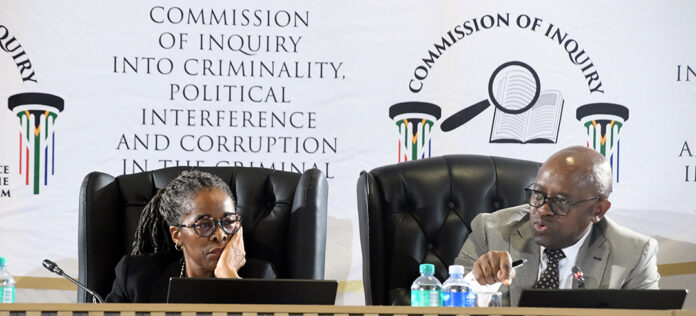In 1994, South Africa emerged from decades of apartheid tyranny into a new democratic dispensation, a beacon of hope led by statesman Nelson Mandela – a global icon of reconciliation, justice and the rule of law.
Mandela’s leadership gave birth to a constitutional democracy designed to heal a divided nation, embodying values of fairness, accountability and equality.
Now, into its fourth decade of its democratic journey, South Africa faces pivotal legal and governance challenges that test the resilience of Mandela’s constitutional project. Two high-profile matters – the asbestos tender case involving Moroadi Cholota and the policing controversies emerging in the Madlanga commission of inquiry – serve as potent reminders of both the strength and fragility of our democratic institutions.
Earlier this year Cholota, the former personal assistant of Free State ex-premier Ace Magashule, found herself at the heart of a landmark constitutional confrontation.
Cholota was set free by the Free State High Court from prosecution involving a R255-million government tender to remove asbestos roofs.
The state charges that the tender was awarded irregularly and corruptly.
In response, the National Prosecuting Authority launched simultaneous appeals to the Supreme Court and the Constitutional Court, aiming to overturn the high court ruling.
Affirming the primacy of the rule of law over institutional overreach, protecting individuals, like Cholota, from unjustified prosecutions, the Constitutional Court dismissed the appeal with costs.
More than anything, the ConCourt decision reaffirmed the essence of constitutional democracy Mandela championed: no one is above the law, and state organs must respect due process
However, Cholota’s case also exposes a significant lacuna in our legal landscape: the absence of formal anti-Slapp (Strategic Litigation Against Public Participation) legislation. “Slapp” tactics involve using costly or vexatious litigation as a weapon to silence public participation or dissent.
Our courts rely heavily on common law principles to mitigate such abuse. This creates uncertainty and inconsistency that often leaves defendants vulnerable to protracted and expensive legal battles.
This legislative gap highlights the urgent need for law reform to offer explicit anti-Slapp safeguards – thus preserving civic freedom, protecting whistleblowers, and ensuring the justice system is not weaponised to suppress transparency and accountability.
Parallel to the Cholota saga is the high-stakes inquiry unfolding under the stewardship of retired Justice Mbuyiseli Madlanga. The commission is investigating systemic corruption and institutional capture within the criminal justice system, specifically focusing on political interference in policing.
So far, a central issue spotlighted by the inquiry is the legality of suspended police minister Senzo Mchunu’s decision to disband the Political Killings Task Team probing such murders in KwaZulu-Natal.
The question posed touches the intricate constitutional division of powers enshrined in Section 207(4) of the Constitution. While the national police commissioner controls and manages the police service, this is to be conducted in accordance with national policy and ministerial direction.
This dual command structure embodies a nuanced balance between operational independence and democratic accountability.
On one hand, it aims to insulate policing from political interference, ensuring that day-to-day management resides with professionals. On the other, it mandates accountability by ensuring police actions adhere to policy frameworks set by democratically elected ministers, reflecting the will of the people.
The Madlanga commission proceedings reveal tension in how these boundaries are currently interpreted and applied – stemming from ambiguity in statutory instruments like the South African Police Service Act, which lacks precise definitions of the scope and limits of ministerial “policy” and “direction”.
This ambiguity opens pathways for conflicts, institutional confusion and governance challenges that ultimately jeopardise the integrity of law enforcement and public trust.
Both the Cholota case and the Madlala commission underscore a broader question about the legacy of Mandela’s moral and political leadership. Mandela’s stature infused governance structures with symbolic authority, inspiring institutions and society to uphold principles of justice, fairness and equality.
However, with the passing of time and shifting political leadership, the democratic project is confronted with the limits of relying on moral authority alone.
The cases also show that no normative legacy, however powerful, can substitute for a robust legal framework and sound institutional checks built into the architecture of the state.
Legislative improvements such as anti-Slapp laws and policing governance reforms are necessary complements to safeguard fairness, accountability, and institutional integrity.
Three decades after Mandela’s presidency, SA remains a democracy distinguished by a progressive constitution, judicial independence, and a vibrant civil society. Yet persistent challenges – corruption, inequality, political factionalism, and governance deficits – continue to test the resilience of its constitutional democracy.
What these cases also tell us is: South Africa’s democratic journey is unfinished. Renewal and reform are essential to build a constitutional democracy capable of withstanding contemporary challenges and securing justice and dignity for all.
- Lekota is a veteran journalist
Visit the SW YouTube Channel for our video content



